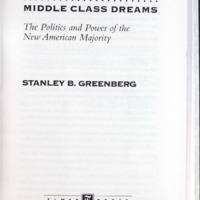-
Title
-
Middle class dreams : the politics and power of the new American majority
-
Description
-
Nearly ten years ago Stanley B. Greenberg was the first observer to identify the depth of the middle class's disaffection with the two political parties, which today we take for granted. In Middle Class Dreams, Greenberg reveals how our nation has found itself in a political environment where voters are poised to shoot first and ask questions later. He examines how the two major parties have historically wooed the middle class - sometimes successfully, sometimes not - and how the traditional party strategies have imploded during the past thirty years. In a powerful analysis he shows how Democratic support for "the little guy" became identified in the 1960s and 1970s with welfare for the "undeserving poor," eroding the middle-class majority who had supported Kennedy and Johnson; likewise, in the 1980s, Republican belief in free-market prosperity deteriorated into an endorsement for greed, breaking the back of the Reagan-Bush majority. These dual betrayals, Greenberg argues, set the stage for the middle class's abandonment of the traditional party system in 1992. Drawing on original polling data, Greenberg lays out the pitfalls facing both major parties if they fail to recognize the new rules of political life, including the role played by the followers of Ross Perot, loyal to neither party and suspicious of both. He is brutally honest about the challenges facing the Democrats and the Republicans, and he backs up his arguments with the raw data he has gleaned from focus groups coast to coast.
-
Identifier
-
529198
-
812923456
-
Creator
-
Greenberg, Stanley B
-
Format
-
1st ed.
-
Source
-
Brian Lamb Booknotes Collection
-
Gift of Brian Lamb, 2011.
-
Catalog record
-
Language
-
eng
-
Date
-
1995
-
Program air date: April 9, 1995
-
Publisher
-
Times Books
-
George Mason University. Libraries. Special Collections & Archives
-
Text
-
Transcription of Annotations
Notes on front endpaper: Corrupt politics. When did first meet Bill Clinton. How do focus groups work? Election 1896 p. 57 McKinley v. Bryan--more than any other election in history-shaped the future. Race and Vietnam. Top down-Rep. Bottom-up-Dems. How many times have been to Macomb County. Biography theory p. 224. Manhattan Project. Perot voters, 233. Underlinings/Notes: Underlinings: Political reality obscured by amount of news. Period of change--political convention crashed, political leaders struggle to invent something new. Lamb underlines details on political parties, their rise/fall. He also highlights E.J. Dionne Jr.'s "Why Americans hate politics," another Booknotes book. Today voters focus on Congress--symbol of personal greed. Reagan's appeal to working class. Perceptions of Democrats. Notes: "Voters feel betrayed," "1994 corrupted politics," "lies, perks, checks, privileges," "Can anyone lead?" "Pervasive pessimism," "Kennedy 63%; RR 67%," "Vulnerability, betrayal, virtue and honor." "Plants head South," "welfare recipient," "Reagan 64%, Bush 39%, Clinton 38%, Perot voters chose Clinton 43% to 36%, 1994 Republican Senate Bonior 62, Levin 50," "Republicans, Democrats two broken contracts." "period of corruption," "Civil War pensions," "Bryan and moral content," "refrigerators, cars, telephones," "Forgotten man," "Johnson bold, but failed," "Race and the parties," "Roosevelt didn't support poll tax, etc.," "Republicans and race," "1964 Republicans broke on civil rights," "War on poverty," "middle class voters rejected graph," "Carter, Mondale, Dukakis," "Crash of the Great Society," "1990 Clinton DLC speaking tour--theme of responsibility," "the Perot voter profile," "1/4 of Perot voters leaned DEM...Anti-government, anti-establishment," "corrupt, arrogant, political leaders," "Big Government and Clinton," "Hostility to Bureaucracy & special interests," "Dems wrong on values."
-
Subject
-
"Clinton, Bill, 1946-"
-
"Middle class--Political activity--United States."
-
"Middle class--Political activity--Michigan--Macomb County."
-
Relation
-
Original Booknotes interview
-
Rights
-
This work may be protected by copyright laws and is provided for educational and research purposes only. Any infringing use may be subject to disciplinary action and/or civil or criminal liability as provided by law. If you believe that you are the rights-holder and object to Mason’s use of this image, please contact speccoll@gmu.edu.
 529198.pdf
529198.pdf